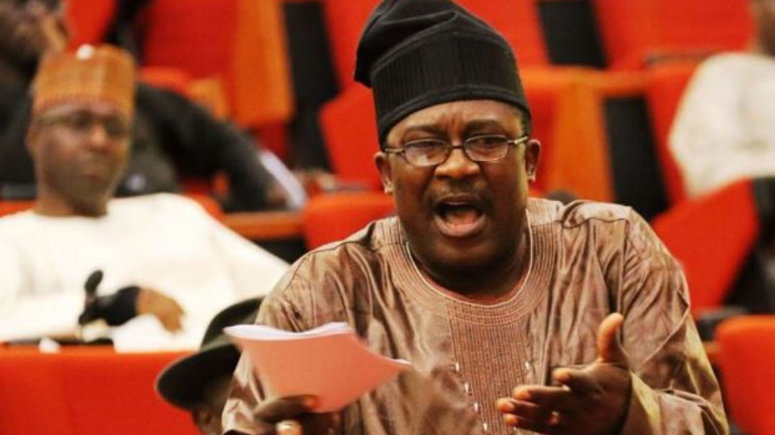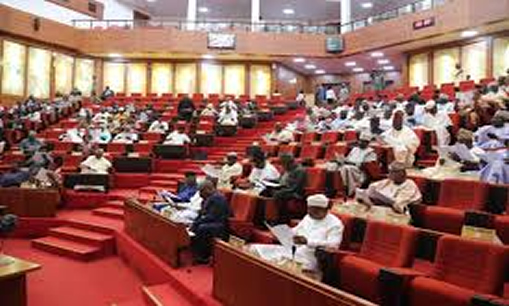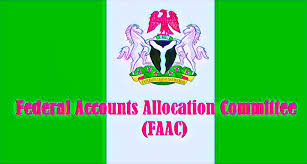News
Senators knock each other over 13% oil derivation for new oil States in NDDC amendment debate

Senators from the Niger Delta region and those of other states where oil have been discovered resorted to knocking each other on the floor of the Senate over a bill for an Act to amend the Niger Delta Development Commission (NDDC) for the inclusion of new oil producing areas.
The bill was sponsored by Senator Solomon Adeola Olamilekan representing Lagos West Senatorial District and was meant to include States where oil and gas deposits have been discovered in the NDDC act for purposes of benefitting the 13% revenue derivation.

The lawmaker in his lead debate argued for inclusion of States that have officially joined the status of oil producing States into the Niger Delta Development Commission,.
The bill was read for the first time in the Red Chamber on Tuesday 17th December, 2019.
Part of his lead debate said: “Following the discovery of Oil in Bauchi, Lagos and Ogun, these states have officially joined the League of Oil Producing States in Nigeria following the discovery of crude oil in Alkaleri Local Government, Bauchi; Badagry, Lagos, and Ipokia, Ogun state.
“By virtue of this, the states are entitled to the 13 percent derivation that is due to oil producing States according to the provision of Section 162 Sub-Section 2 of the Nigeria Constitution.”
He further argued that the purpose of the Bill is for the Act to make provision for new states who have joined the league of Oil producing states in Nigeria and for states that might eventually discover oil in the future as opposed to the present position of the Act which only covers Oil producing states within the Niger Delta region in other to save cost and set precedence in Nigeria.
“In conclusion, this amendment is to accord the same provisions of the law amongst other benefits accrued to oil producing states in Nigeria to the new oil producing states and future oil producing states.”
Reacting, Deputy Senate President, Senator Ovie Omo-Agege described the Lagos lawmaker as “meddlesome interloper”, saying that the bill was dead on arrival.
He said: “Mr. President We look forward to the day when indeed all states in Nigeria will not only produce oil but produce one form of mineral resources or the other.
“Dealing with the issue of 13%, to us that is not an issue to the extent that they produce oil in commercial quantity and DPR so determines, that oil is been sold, and revenue is sent to the federation account. That is not the issue yet. The issue is whether or not just because they are oil producing they should come under NDDC, if you are looking for meddlesome interlopers, you don’t have to go too far to find one.”
“What this lead debate clearly shows that my colleague from Lagos is a classic meddlesome interloper. The Niger Delta Development Commission is a regional development commission. We must draw a distinction between the NDDC and the oil and mineral producing commission.”
On his part, Senator Sekibo congratulated states that have recently attaining the status of Oil Producing States but wondered if they have attained the status of producing in commercial quantity.
Earlier, in his contribution, Senator Ahmad Baba Kaita representing Katsina North Senatorial district, having supported the amendment proposal, recalled how a former GMD of NNPC told Senators previously that Nigeria would become one of the largest oil producer in the world, if oil discoveries in the country are harnessed.
He said: “Thank you Mr. President I remain Senator Ahmad Baba Kaita, Katsina North Senatorial district. Regarding the motion on the oil producing States, I think what is good for the goose is good for the gander. In the State like Borno, where oil has been discovered, I remember the former Group Managing Director of NNPC arguing here that with such States coming on board, Nigeria will be one of the largest oil producer if we harness our resources.
“In this case, it is only fair for us to consider those States that produce oil, because the consequences of exploration is going to affect the environment. The idea behind that motion is consequences of oil exploration.”
However, Senator George Thompson Sekibo urged Senators to treat the amendment with caution.
He advised lawmakers to find out if those States have started contributing to the Federation account through their oil, adding that exploration of oil in commercial quantity was precedent, since the derivation sharing was based on quantity of oil produced
“Mr President, I congratulate these States where they said they have discovered oil. What I want to know is whether they are of commercial quantity and whether there are being drilled out now and the money is going into the Federal government Account.
“We have not confirm that one yet, but as oil has been discovered there, we want oil to come out of every soil in Nigeria. Are they exploring the oil? Are they refining oil there and has oil caused devastation in those States.
“Mr President, the purpose of Niger Delta Development Commission Act is not because they found oil there but because the oil has caused so much devastation and there was need to remedy the place.”
Senator Mathew Uroghide representing Edo North Senatorial district disagreed with the proposed amendment completely, stating that the NDDC Act was specifically meant to address environmental degradation of the Niger Delta region.
According to him, the inclusion of some northern oil States in the Act will defeat the original intention of the Act.
He said: “Thank you Mr. President. I am Senator Mathew Uroghide representing Edo South Senatorial district. I consider it a privilege to contribute to a bill being sponsored by Senator Solomon Adeola Olamilekan. I am not particularly against the sponsor of the bill, but I feel the bill must be properly presented.
“Let’s start with the name, “Niger.Delta Development Commission”, NDDC. Today the area that is referred to as Niger Delta is very clear. The States that made up of Niger Delta region that the Commission is serving is very clear.
However, the amendment proposal scaled second reading in readiness for public hearing.

























